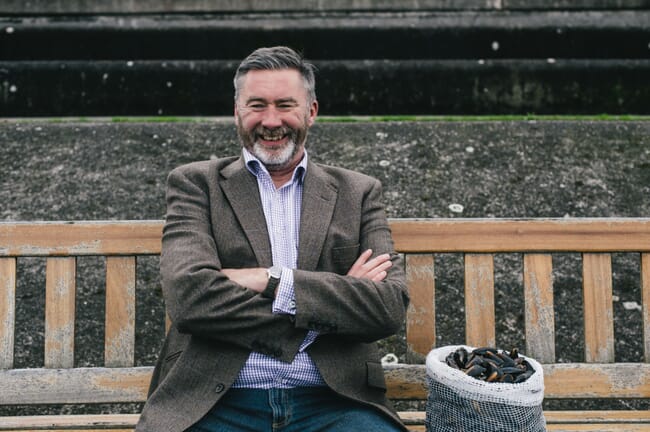“This season we will produce around 450 tonnes, an increase on last year of over 30 per cent, and we expect this to grow to around 1,000 tonnes over the next 3 years,” Cameron Brown tells The Fish Site. “There’s no point just dumping it on the market, which is why the ASC certification will help.”
LFO was the first company in the world to have their blue mussels (Mytilus edulis) certified to the ASC’s bivalve standard, which has generated considerable interest in the Argyll-based firm.

© Loch Fyne Oysters
“We were surprised to the be the first blue mussel producers globally to be ASC-certified,” he says, “but it’s fantastic. We’re really pleased and we’ve had a great response from our customers.”
He was also pleasantly surprised by the comparative ease and speed of the certification process, which took place at their site in Loch Roag, off the west coast of Lewis.
“We were pretty confident that the way that we farm was quite close to what they were looking for, but it went remarkably smoothly,” he reflects. “The costliest element was the seabed analysis, but we had a lot of help for the underwater surveys from the Scottish Salmon Company, who also farm in Loch Roag – we’re both part-owned by Scottish Seafood Investment and their MD, Craig Anderson is also our Chairman, which helps encourage collaboration.”
Adding value
As a result of the experience, he believes that – at least for some fellow mussel growers – achieving certification would be a valuable goal, not just as a possible means of achieving higher prices.
“Although there are additional costs associated with farming to such rigorous standards, ASC accreditation was not pursued as a means by which selling prices can be increased. However, this, in conjunction with other initiatives on packaging technology and distribution will make our mussels accessible to a wider and more discerning market where differentiation based on ethical farming is becoming increasing important,” he explains.
“It depends on your market but if, like us, you’re all about provenance, stewardship and sustainability – values shared by ASC – it’s very worthwhile, as our customers have been quick to point out,” he adds.
Certification and their increases in mussel landings seem to be vindicating the company’s recent change in production strategy – which saw them mothball their mussel sites in their traditional production area, Loch Fyne, in favour of concentrating on Loch Roag.
“We pulled out of Loch Fyne about 18 months ago – our sites there were right at the head of the loch, where the high volumes of fresh water coming in were slowing down mussel growth,” explains Cameron.
“As a result we moved all the equipment up to Loch Roag – a site which we took over about four years ago. This has enabled us to increase production there and we’re now looking to raise funds for a second workboat,” he says.
Not just mussels
As the Argyll-based company’s name suggests, mussels are not the only bivalve they produce, and moving their mussel ropes from Loch Fyne also helped to improve another aspect of their farming.
“The reason we moved the mussels from Loch Fyne – the low salinity – is better for oysters, as it gives them a sweeter taste,” says Cameron. “And they’re also growing quicker now that the mussels have been moved, as there’s more food available for them.”
This is one factor that has helped LFO to target an oyster production increase.
“We’re currently producing about 2.5 million [oyster] shells each year and, like mussels, are planning to increase production further over the coming years,” says Cameron. “We are also one of the few companies (perhaps the only one now) to hatch our own seed oysters from broodstock before growing in our nursery, down at Whalney Island in the Lake District. We also supply 25-30 million of these seed oysters a year on a commercial basis to many farmers around the Scottish coast who then grow them on to market size.”
“We’re also looking to produce more native oysters (Ostrea edulis) at a new site on the west coast and we may look at further ASC accreditation for other aquaculture activities in the future,” he adds.
Moreover, LFO are involved in an integrated multi-trophic aquaculture (IMTA) project with the SSC, which includes the production of queen scallops, sea urchins and seaweed near one of their salmon sites on Loch Fyne.
“These aren’t really produced at commercial volumes, it’s more of a pilot project, but it’s an excellent showcase and our customers love going out to the site,” Cameron explains.
Post-production
Outside of aquaculture, LFO are probably most well known for their chain of seafood restaurants, which act as an important outlet for the shellfish they farm, but they are also building up a relationship with a range of other retailers.
“We’ve been looking at new retail outlets. Costco are now selling 4 tonnes of our mussels a week, while [online retailer] Ocado have started selling 1 kilo bags,” says Cameron.
They have also been developing a range modified atmosphere packaging (MAP) live mussels.
“Using MAP we can offer a range of live mussels that come complete with a sachet of fresh sauce and enable consumers to produce genuinely restaurant quality mussels at home,” he says.



